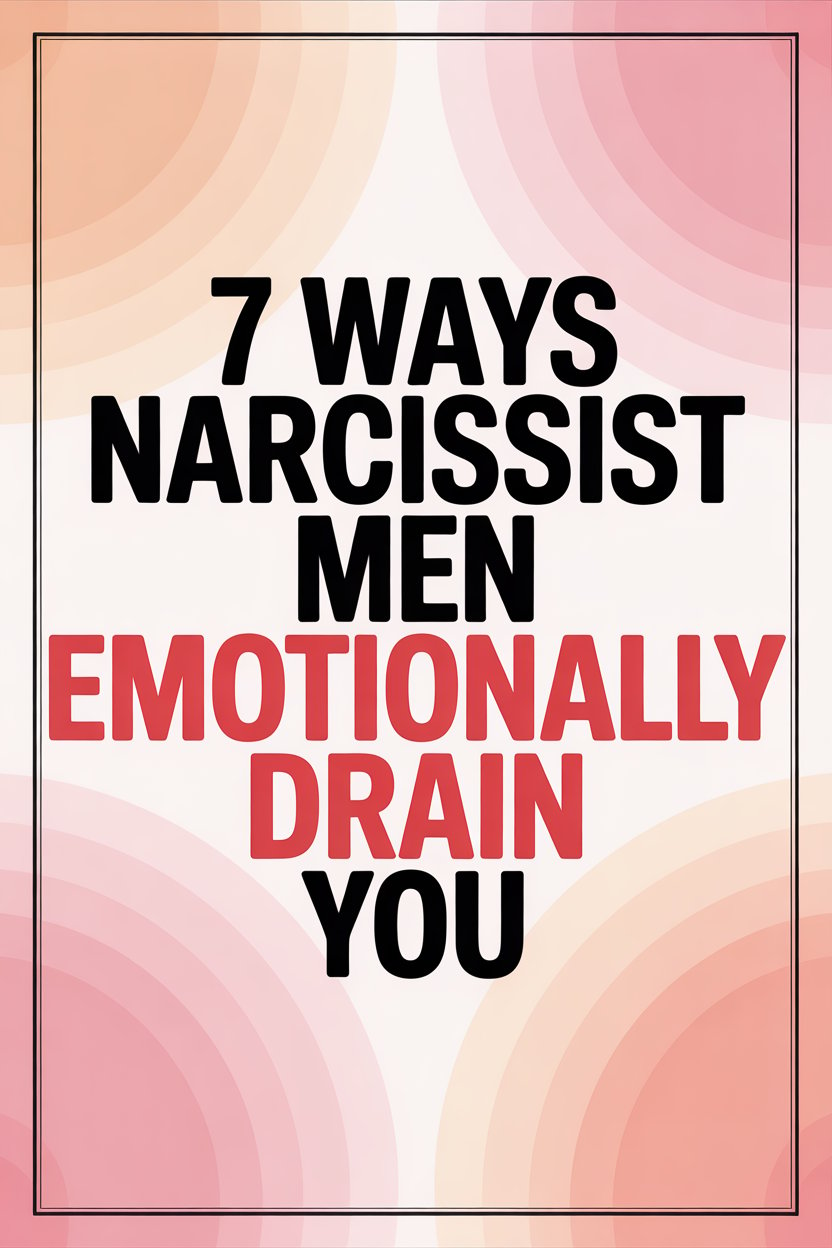Ever felt like you’re running a marathon on an emotional hamster wheel—and someone else keeps moving the finish line? Welcome to life with a narcissist.
There’s a reason people say loving a narcissist is like hugging a cactus: the closer you get, the more it hurts.
If you’re trying to figure out why your energy’s sapped and your self-esteem’s looking for the nearest exit, it might be time to look at the behaviors that keep you stuck on the draining end of the hose.
Ready for a reality check dressed up with a side of gallows humor? Here’s how narcissist men can leave you feeling like yesterday’s phone battery.
1. Gaslighting Until You Question Your Own Name
Gaslighting isn’t just a trendy therapy word; it’s practically a national sport in the world of narcissists.
He’ll insist something didn’t happen, even if you have the receipts, a PowerPoint, and possibly a skywriter spelling out the event above your house.
“I never said that.”
“You’re being too sensitive.”
“It’s all in your head.”
After a while, you start wondering if it actually is all in your head. Reality gets as wobbly as a jelly at a kid’s birthday. Instead of feeling seen, you find yourself apologizing…for things you can’t even remember.
That kind of mental gymnastics will leave anyone emotionally bankrupt.
What can help:
Keep a journal. It’s not just for angsty teens or writing bad poetry. Jotting things down gives you something concrete to look back at when he starts rewriting history.
Sometimes, you need to be your own detective—and trust your version of events, even when he swears the sky is green.
2. The Emotional ATM—Withdrawals Only
Narcissist men tend to treat emotional support like a one-way street. When life’s tough on his end, everything’s an all-hands-on-deck emergency.
He needs comfort, reassurance, praise, and probably someone to fluff his ego pillow.
But try getting a little support when it’s your turn. Suddenly, he’s busier than a barista at Monday morning rush. He might dismiss your feelings, change the subject, or offer a solution so useless it would make a Magic 8 Ball blush.
After a while, you notice the emotional scales are tipped so far out of balance, they’ve toppled off the table.
What can help:
Ask yourself: what would you tell your best friend if she was getting crumbs? It’s time to start expecting the basics—like empathy and kindness. If you’re pouring from an empty cup, eventually you’ll run out of anything to give.
3. Criticism Disguised as “Helpfulness”
The narcissist’s favorite pastime? Pointing out your flaws, but with a twist that makes it sound completely reasonable. Apparently, he’s just “trying to help,” “being honest,” or “saying what nobody else will.”
He’ll pick apart your outfit (“Are you sure about those shoes?”), your ambitions (“You really think you can do that?”), or even your laugh (“It’s kinda loud, babe”).
Each little comment chips away at your confidence, until you’re second-guessing your every choice—right down to how you butter your toast.
All this “constructive criticism” leaves you feeling like a fixer-upper no one asked for.
What can help:
Start a mental scoreboard. Every time he offers “help” that feels like a dig, make a note. Draw a line between helpful and harmful. Then, reroute that energy toward people who build you up, not knock you down.
4. Playing Hot and Cold—The Human Weather Vane
One minute, he’s showering you with affection, grand gestures, and attention that borders on obsessive. The next, he’s as emotionally distant as a cat in a thunderstorm.
You’re left chasing after the highs, wondering what you did wrong to deserve the lows.
This push-pull dynamic hooks you in, convincing you that if you just try a little harder, you’ll get back to the “good times.” Spoiler alert: those were probably just the bait.
Living on this emotional rollercoaster is exhausting. You never know which version of him you’ll get, and soon, your mood is tied to whatever weather system he’s blowing through today.
What can help:
Recognize the pattern. It’s not your job to win back affection you never truly lost. Step off the ride and start setting boundaries. Consistency, not chaos, is the real sign of love.
5. The Victim Olympics—Gold Medalist Every Time
No matter what happens, somehow, he’s always the one who’s been wronged. He might spin every story—no matter how minor—so he’s the poor, misunderstood hero surrounded by a world of villains.
If you call him out? You’re “attacking” him.
If you need something? You’re “too demanding.”
Instead of problem-solving, you end up managing his feelings, tiptoeing around his ego, and apologizing for things that aren’t your fault.
The weight of his perpetual victimhood will leave you carrying bags heavier than a lost-luggage claim at Heathrow.
What can help:
Remind yourself you’re not responsible for his feelings—or his narrative. You can’t rescue someone who doesn’t want to swim. Let him win the Victim Olympics without dragging you into the arena.
6. The Never-Ending Power Struggle
Everything becomes a competition, and the prize is control. Narcissist men have a sixth sense for finding the tiniest way to assert dominance—where to eat, who you see, what you wear.
Suddenly, compromise is a dirty word, and every disagreement turns into a three-act play.
He has to have the last word, the final say, the remote control. Compromise? Only if it means you’re agreeing with him.
This constant power struggle wears you down, until you start to lose sight of your own needs. Your wants shrink smaller and smaller, just to keep the peace.
What can help:
Start small. Reclaim decision-making in day-to-day life, even in little things—what to watch, what to eat, when to see your friends. Stand your ground on the things that matter.
A healthy relationship leaves space for two voices, not just one megaphone.
7. Disappearing Acts—Emotional Abandonment in Plain Sight
Physical presence doesn’t always mean emotional availability. Narcissist men can be right beside you, scrolling their phone or staring into space, and still be a million miles away.
When you share something—hopes, fears, even a funny meme—he responds with a grunt, a shrug, or a blank stare. It’s like shouting into a canyon and waiting for an echo that never comes.
Over time, this emotional absence creates a loneliness that’s even harder to bear than being alone. You start to wonder: if a tree falls in the forest of your relationship, does anyone hear it?
What can help:
Stop mistaking proximity for intimacy. True connection means showing up emotionally, not just physically. Seek out people—friends, family, a therapist—who actually listen and respond.
Your stories matter, even if he’s too preoccupied with his own reflection to notice.
Reclaiming Your Sanity—One Step at a Time
Getting out from under the emotional drain of a narcissist man isn’t about flipping a switch or delivering a dramatic movie monologue.
It’s the thousand tiny choices—saying no, calling out gaslighting, demanding respect, and remembering what it feels like to have your battery, not just his, charged.
You’re not crazy, too sensitive, or asking for too much. You just want a relationship that doesn’t feel like emotional boot camp.
Start by trusting your gut, honoring your own needs, and surrounding yourself with people who don’t need to win every argument to feel good about themselves.
And if you’ve lost your sense of self somewhere along the way, don’t worry—it’s still there, waiting for you to unplug him and plug back into yourself.
Cheers to reclaiming your energy, your self-respect, and a little peace of mind. You’ve earned it.


